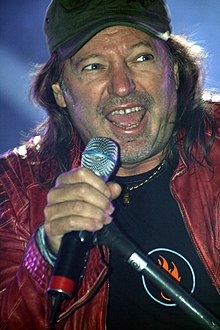Vasco Rossi
| Vasco Rossi | |
|---|---|
 |
|
| Background information | |
| Born | 7 February 1952 |
| Origin | Zocca, Emilia-Romagna, Italy |
| Genres | Pop rock |
| Years active | 1977–present |
| Website | www |
Vasco Rossi (born 7 February 1952), also known as Vasco or with the nickname Il Blasco, is an Italian singer-songwriter. During his career, he has published 26 albums (not including unofficial releases) and has written over 250 songs, as well as lyrics for other artists. He calls himself a "provoca(u)tore" (an Italian portmanteau for "provoking author") as throughout his career he has been regularly criticized over his choice of lifestyle and the lyrics in his songs.
Vasco Rossi was born in Zocca, in the province of Modena (Emilia-Romagna). His father, Carlo Rossi, was a truck-driver, and his mother, Novella, a housewife. It was his mother herself who decided to enroll him in singing school when he was a little boy, a choice that must have seemed rather peculiar within the mentality of a small village in the Apennines like Zocca. Nonetheless, Rossi fell in love with music and at the age of 14 began playing with his first band.
Rossi and his family moved to Bologna, Italy, where he studied accounting in high school. Upon graduating he opened a music club, Punto Club, and enrolled in university at the faculty of Economics and Business. In the meantime he supported himself by working as a DJ and founding, along with friends, one of the first private radio stations in Italy, "Punto Radio", with which he began slowly and timidly showcasing his own songs.
Encouraged by his friend Gaetano Curreri (now leading member of Italian rock band Stadio), Rossi released his first EP on 13 June 1977, which included the songs "Jenny è pazza" (Jenny is crazy) and "Silvia", and a full-length album in 1978, Ma cosa vuoi che sia una canzone ("What do you think a song is"). In 1979, he released a second album, Non siamo mica gli americani ("It's not, like, we are the Americans"), which included, "Albachiara" ("Cleardawn"), one of his biggest hits, and a ballad considered emblematic of Rossi's poetic style. His most controversial album, Colpa d'Alfredo ("Alfredo's fault") followed in 1980; its title-track was censored from the radio and let loose bitter criticism because it contained some lyrics referring to women considered too explicit at that time. The controversy actually increased Rossi's popularity, and he quickly saw himself famous on a national level, particularly after performing live on Domenica In, a popular Italian television program. The performance did not particularly please journalist Nantas Salvalaggio, who published a scathing article against Rossi calling him a drug addict. Rossi argued that Salvalaggio evidently did not understand his music and remarked how easy it is to criticize a still unknown artist who cannot defend himself.
...
Wikipedia
